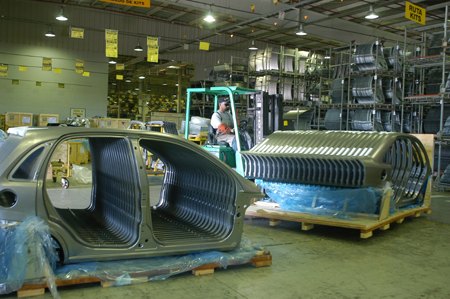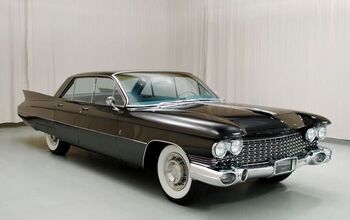GM: Kicking the Habit
General Motors has a monkey on its back: another monkey. Actually, three point one monkeys. Writing in the August issue of The New Yorker magazine, Malcolm “Tipping Point” Gladwell explored the possibility that GM’s need to support an enormous population of retired workers is dragging the company into the abyss. Although it’s not exactly a new idea, Mr. “Blink” applied a new tool to the job: the dependency ratio.
Economists use dependency ratios as an analytical tool to examine national economies. It’s a pretty simple concept. Imagine a single man bringing down $100k a year. Mr. Man’s got sufficient liquidity to buy a brand new Corvette. Now imagine the same guy making the same money married with 2.3 kids. He can only read about the joys of Corvette ownership (probably here, for free).
The single guy's supporting one person with one income, creating a one-to-one dependency ratio. Assuming his wife doesn't work, the married man’s living not-so-large at three-point-three-to-one. The more dependents a productive worker/economy must support, the less profitable and thus, financial viable, he/it is.
Gladwell’s article applies the dependency ratio to General Motors, casting retirees as company dependants. In 1962, GM had 464k active employees generating sufficient profits to support 40k retirees. The company’s dependency ratio was one to 11.6.
By 2005, GM had 141k active workers failing to provide sufficient profits to support 453k retirees. The General’s dependency ration has increased to a startling 3.2 to 1. In other words, every GM worker has 3.2 mouths to feed.
Productivity gains– related to just-in-time manufacturing and widespread automation– have helped mitigate the impact of GM’s retiree bulge. The General produces more cars with fewer workers than it did back in the early sixties. Unfortunately, this is a fact not a competitive advantage. Everyone in the automotive industry must do more with less. (Some automakers do it a lot better than GM, but that’s a ratio for another day.)
Ford and Chrysler are in similar straits, struggling to increase productivity (and profitability) to keep pace with their increasing dependency ratio. However, no company has as many retirees as The General. As the industry’s dependency “leader,” the enormous weight of their pension and health care obligations put the company at a huge competitive disadvantage.
General Motors would not be the first American company to collapse under the strain. Gladwell cites Bethlehem Steel as an example of a dependency ratio’s ability to destroy a business, if not an entire industry. In the ‘50’s, steel was one of America’s sturdiest, most important industries. Bethlehem stood at the top of the [slag] heap.
Competition from Germans and Japanese steel mills led to smaller and smaller proft margins. Bethlehem began to flounder. Between 1960 and 2000, the company shed 90% of its workforce. In 2001, Bethlehem Steel finally broke under its $7b pension and healthcare obligations, and filed for bankruptcy. Does any of this sound familiar?
Now the “good” news. After Bethlehem Steel’s pension fund was terminated in 2003, the company’s new owners restructured other obligations and started over. The new company’s dependency ratio sank to zero to one. The steelmaker turned a profit in six months, successfully competing against Germans, Japanese and the rest of the world.
The American auto industry in general– and General Motors in specific– understand the competitive disadvantages created by their “legacy costs.” And yet, GM, and now Ford, and soon Chrysler, are downsizing their business by offering union workers “buyouts”: lump sum payments that trim payrolls but do little to relieve their health care and pension costs.
In many ways, buyouts make sense. Cutting production and workforce lets you match supply with demand, and, hopefully, make a buck. But as the company chips away at its work force, it increases its dependency ratio. Buyouts mean fewer workers with even more people to support.
The only way out of the buyout trap: make more money per car. That’s tough to do when you’ve been selling discounts, rebates and finance programs for years, and your competitors don’t share your dependency problems. The margins in the auto industry have thinned like Kojak’s pate, especially in the low to mid-range market— GM’s unhappy hunting ground. Even the once mighty margins on light trucks and SUVs have taken a hit.
Unless GM can knock one (or ten) out of the park, the only way out of the dependecy trap is… volume. Back up two paragraphs and repeat.
Of course, GM can’t repeat. Every business cycle costs money; The General lost $8.6 billion last year. The repeat is actually a spiral; the plane without an engine kind. Spend, shed, spend more, shed more. In the end, the guy with 3.2 dependants will not be forced to ogle his single buddy’s ‘Vette. The company with 3.2 dependents per worker couldn’t afford to make it in the first place.
For most dependency problems, there’s a rehab program. For this particular affliction, it’s not twelve steps. It’s chapter eleven.
More by Michael Martineck
Latest Car Reviews
Read moreLatest Product Reviews
Read moreRecent Comments
- Make_light I like Subarus, and I often think they don't get enough credit for how they drive. Lots of people say it's the faux-rugged image that accounts for their popularity, but they also drive with a solidity and plantedness that's absent from a lot of the Japanese competition. That being said, this thing is ugly. I never felt that Subarus were as ugly as commenters claim they are. Boring, sure, but not necessarily ugly. But between this and the refreshed Legacy, it's like they're trying to make their vehicles look as incohesive and awkward as possible.
- SCE to AUX I think the 2.2 was a pretty durable engine.
- Rochester We'll probably be trading in our 2018 Touring Edition Forester for the next model, and are waiting to see what the Hybrid is all about. Would be nice if they disclose whether or not it will be a plug-in Hybrid.
- CEastwood I have a friend who drives an early aughts Forrester who refuses to get rid of it no matter all it's problems . I believe it's the head gasket eater edition . He takes great pains regularly putting in some additive that is supposed prevent head gasket problems only to be told by his mechanic on the latest timing belt change that the heads are staring to seep . Mechanics must love making money off those cars and their flawed engine design . Below is another satisfied customer of what has to be one of the least reliable Japanese cars .https://www.theautopian.com/i-regret-buying-a-new-subaru/
- Wjtinfwb 157k is not insignificant, even for a Honda. A lot would depend on the maintenance records and the environment the car was operated in. Up to date maintenance and updated wear items like brakes, shocks, belts, etc. done recently? Where did those 157k miles accumulate? West Texas on open, smooth roads that are relatively easy on the chassis or Michigan, with bomb crater potholes, snow and salt that take their toll on the underpinnings. That Honda 4 will run forever with decent maintenance but the underneath bits deteriorate on a Honda just like they do on a Chevy.


































Comments
Join the conversation
401k's were not available until 1978. The Bethlehem Pensions were turned over to the Pension Benefit Guaranty Corp. (PBGC) ( http://www.pbgc.gov/ ). They were able to turn over 2.6 Billion. The PBGC currently has deficit of over 26 Billion for last year. With Delta and Northwest Airlines dumping pensions to the PBGC, this will no doubt grow. The tax payers of course are on the line for this deficit. I predict in the next 10 years all company pensions will be either frozen, or turned over to the PBGC.
Pensions have always been a terrible idea, an artifact of mass stupidity and short-sightedness during a few decades of the 20th century. People in the past eras didn't have pensions, and people of the future won't have them, but we contemporaries are still stuck with the mess. It's been clear for the past century that people were living longer and longer and it's been clear for decades that fertility rates would tend to drop in prosperous countries, so there's been no excuse for ignoring that fact either for GM executives or government planners or politicians or anyone. I just wonder if GM execs of the past were aware of the risks and had a short-timer mentality, maybe they always figured they could declare bankruptcy in a pinch and shove the burden on the taxpayers, or what? As for social security, it's still an awful system but it won't go "bankrupt" (whatever that might mean for a government program) because the gov't will simply as necessary raise retirement age, reduce benefits, raise payroll taxes, borrow money. The government has a lot of levers and absolutely no legal obligation to live up to curent expectations. But it kills me that we let other countries such as Chile and even Canada(!) be more progressive in privatizing social security.